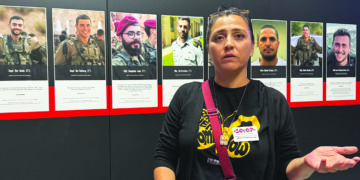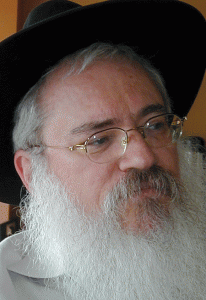By MORDECAI SPECKTOR
It was not the publicity the Lubavitchers were looking for.
Rabbi Manis Friedman, an esteemed Chabad-Lubavitch rabbi from St. Paul, became the focus of controversy last week stemming from his short article in the recent issue of Moment magazine.
In the magazine’s “Ask the Rabbis” column, Friedman, and rabbis from other Jewish streams, responded to the question, “How Should Jews Treat Their Arab Neighbors?”
Under the “Chabad” heading, Friedman wrote: “I don’t believe in Western morality, i.e., don’t kill civilians or children, don’t destroy holy sites, don’t fight during holiday seasons, don’t bomb cemeteries, don’t shoot until they shoot first because it is immoral.”¨”¨ The only way to fight a moral war is the Jewish way: Destroy their holy sites. Kill men, women and children (and cattle).”¨”¨”
Over four paragraphs in the national magazine, Friedman, who is the director of the internationally renowned Bais Chana Women’s Institute in West St. Paul, argued that “the first Israeli prime minister who declares that he will follow the Old Testament will finally bring peace to the Middle East,” because Israel’s enemies will be intimidated and “with their holy sites destroyed, they will stop believing that G-d is on their side.”
Although Friedman later stated, in a post to the Moment blog, that he had answered a “different question,” his original article was widely denounced.
In a June 3 statement, the rabbi’s own Chabad-Lubavitch movement said that they “vehemently disagree with any sentiment suggesting that Judaism allows for the wanton destruction of civilian life, even when at war. In keeping with Jewish law, it is the unequivocal position of Chabad-Lubavitch that all human life is G-d given, precious, and must be treated with respect, dignity and compassion.”
And Rabbi Moshe Feller, director of Upper Midwest Merkos Chabad-Lubavitch and Friedman’s boss, said that he “reprimanded” Rabbi Friedman.
“I felt it was very irresponsible,” Feller said, regarding the comments published in Moment. Although Feller said that Friedman was responding to Israel’s conduct “with the Arabs in a case of war, he shot from the hip; because, even then, he should not have said it the way he did.”
The Minnesota Rabbinical Association (MRA) also took exception to Friedman’s viewpoint. In a letter published Monday in the Star Tribune, Rabbi Aaron Brusso of Adath Jeshurun Congregation and Rabbi David Locketz of Bet Shalom Congregation wrote, on behalf of their MRA colleagues: “[Friedman’s] remarks, as printed, do not in any way reflect our religious beliefs and values. Rather, as religious leaders, we strongly endorse the values of the pursuit of peace and the sanctity of life. While Rabbi Friedman has the right to speak as an individual, we profoundly disagree with his words and distance ourselves from them. We also believe in the Jewish principle of dan l’kaf zechut, giving someone the benefit of the doubt, and hope that he will clarify his remarks very soon.”
Regarding this last point, Rabbi Amy Eilberg, in a commentary for the Star Tribune’s “Your Voices” blog, characterized Friedman’s article as “hate speech, utterly antithetical to the teachings of Jewish tradition.” However, Eilberg mentioned that she is working with other rabbis “to initiate a face-to-face dialogue with Rabbi Friedman.”
Joining the chorus of Jewish voices opposing Friedman’s views, Steve Hunegs, executive director of the Jewish Community Relations Council of Minnesota and the Dakotas (JCRC), issued a statement that condemned “in the strongest possible terms the recent outlandish remarks made by Rabbi Manis Friedman. They are inimical to Judaism and a violation of the Code of Conduct of the Israel Defense Forces, which stresses through the ‘Purity of Arms’ the need to avoid the loss of innocent life. Rabbi Friedman’s comments are not representative of the Minnesota Jewish community and we condemn the killing of innocent civilians and children, as well as the destruction of Islamic holy sites.”
While representatives of Chabad Lubavitch quickly distanced themselves from Friedman’s views, Scott Rosenberg, a blogger from St. Paul who was once a member of the Chabad Lubavitch sect, wrote last week on his Web site (FailedMessiah.com), regarding the Moment article, that he heard “this exact logic from Manis Friedman himself several times during the time I was Chabad. I also heard it from many other Chabad rabbis, and the Rebbe [the late Rabbi Menachem Mendel Schneerson] himself said something similar just after or during the Six Day War, I think, but had it expunged from the written record of his talks immediately after. You’ll find the theology familiar — it comes directly from Rabbi Meir Kahane. It’s no surprise that among Kahane’s biggest supporters were Chabad hasidim.”
Last Friday, Rabbi Manis Friedman clarified his comments. In a post to the Moment blog, he said that his comments did not “represent the official policy of any Jewish movement or organization. Additionally, my answer, as written, is misleading. It is obvious, I thought, that any neighbor of the Jewish people should be treated, as the Torah commands us, with respect and compassion. Fundamental to the Jewish faith is the concept that every human being was created in the image of G-d, and our sages instruct us to support the non-Jewish poor along with the poor of our own brethren.”
Further, as Rabbi Feller told the AJW last week, Friedman said that he was addressing the question of “how should we act in time of war, when our neighbors attack us, using their women, children and religious holy places as shields. I attempted to briefly address some of the ethical issues related to forcing the military to withhold fire from certain people and places, at the unbearable cost of widespread bloodshed (on both sides!) — when one’s own family and nation is mercilessly targeted from those very people and places.”
Finally, Friedman allowed that the words he used were “irresponsible, and I look forward to further clarifying them in a future issue. I apologize for any misunderstanding my words created.”
Friedman’s comments have been reported around the world. Stories appeared in the New York City-based Forward weekly newspaper (picked up by the Web site of Haaretz, the Israeli daily), and on JTA, the Anglo-Jewish news wire service. Articles in both Twin Cities daily newspapers included the denunciations of Friedman’s comments by Jewish groups, and from the Council on American-Islamic Relations (CAIR). The local KSTP-TV evening newscast also featured the Friedman controversy.
Friedman was out of town last week, and did not respond to a call from the Jewish World.
(American Jewish World, 6.12.09)




















